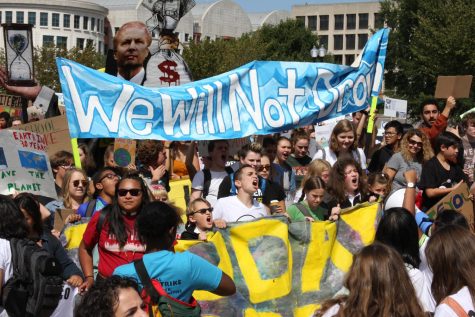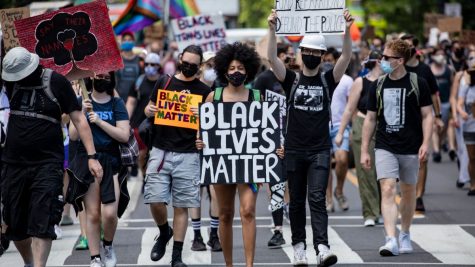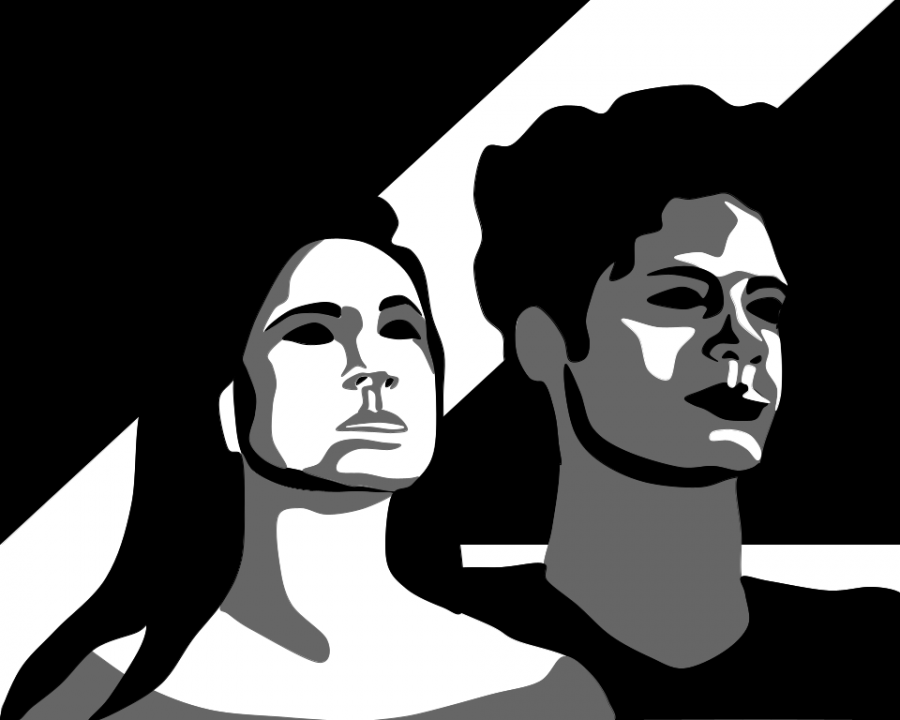Gen Z: A Generation Of Change
January 2, 2021
More than half of the stadium seats were empty. More than a million tickets were reserved—but only 6,200 supporters showed up. At Donald Trump’s campaign rally in Tulsa, Oklahoma on June 20, entire sections were vacant. Supporters were dispersed, unenthusiastically sitting down, staring at their phones or talking amongst themselves. Staff members and aides to President Trump watched the rally and its attendance in shock. Later the same evening, after landing back in Washington D.C., Trump walked off Marine One with a defeated demeanor; his tie hung loose around his neck as he clutched a crumpled red Make America Great Again hat.
Following the rally, Generation Z TikTok users claimed responsibility for the unexpected low turnout. These teens launched a social media campaign encouraging their audience to register for tickets to Trump’s Tulsa rally and then not show up. The trend started to gain influence as videos on TikTok about the rally prank started to receive millions of views. The information spread quickly and soon users registered for hundreds of thousands of rally tickets that would never be used. The teens of America rejoiced as photos of a dejected Trump and sparse crowds began to surface. Generation Z once again showed the world their great power and will for action.
Who is Gen Z?
The students, youth activists, social media influencers and progressives of today who create non-profit organizations, post online content for millions to see and march in the streets are Generation Z. According to demographers, Generation Z is defined by anyone born in the year of 1997 through the year of 2012. This group of youth, who have also been classified as Gen Z, the iGeneration, and Homelanders, are members of the most racially, ethnically and culturally diverse generation that this world has ever seen.
Gen Z is setting new racial precedents as only 52% are non-Hispanic whites, which is down 9% compared to the racial makeup of Millennials. Even though less of Generation Z are immigrants, more and more are children of immigrants, therefore causing 25% of Generation Z to be Hispanic. Immigration will continue, and it has been predicted by the Census Bureau that by 2026, Generation Z will become the first generation that is majority non-white. According to the Pew Research Center, Gen Z is 14% Black, 6% Asian and 5% other races. This diversity will continue to increase in the next six years and will define the future of the generation.
Pew Research Center describes Gen Z and their political character as “progressive and pro-government.” 70% of Gen Z thinks it is the job of the government to do more in order to solve problems instead of businesses and individuals. This belief is stronger at Madison where 85.7%* of Madison students believe that the U.S government should be doing more to solve problems. Even the youngest Republicans of today are more likely to support increased government action. Gen Z Republicans also differ in opinions from the rest of the GOP in terms of racial equality and climate change. A greater percentage of Gen Z Republicans acknowledge and believe that Blacks are treated less fairly and that climate change is due to human activity. As a whole, 54% of Gen Z believes that warming climates are due to human activity and two-thirds recognize the issue of racial inequality for Black people. At Madison, 88.7%* of students believe that Black people are treated less fairly than white people in the U.S. today. Furthermore, 89.9% of Madison students believe that the Earth is getting warmer due to human activity. In terms of current political climates, the vast majority, coming in at about 77%, of Gen Z disapproves of Donald Trump and his presidency. Gen Z’s social and political views are indeed more progressive than any others, but they also spread like no other.
Gen Z, Technology & Activism
To truly understand Generation Z, their experiences and their influences, it is important to recognize their relationship with technology. Gen Z was born into an age where technology already existed. They are the first to be born into a world with Internet, WiFi and mobile devices. Very few members of Gen Z can remember a time before smartphones and social media. The entire generation was immersed into a world with a constant flow of information, social networking, connections to communities in every corner of the world and the rapidly advancing industry of technology. Their connection to technology allows them to use it to their advantage each day.
Any photo, video or information can spread in a matter of seconds through social media. Gen Z has learned to use this to express opinions and spread knowledge about various topics to a global audience. Gen Z is set to be the best-educated generation to date as they are more likely to enroll in college or have a college-educated parent, and they are not hesitating to demonstrate their knowledge. It has become the norm for young people to post graphics and texts on their Instagram stories or retweet facts and quotes on Twitter about information and news stories in order to spread awareness and educate each other. Activists also mobilize mass numbers of people who possess similar opinions and desires in order to create movements. With a touch of a button, photos and videos of protests, activists’ speeches, campaigns and initiatives can be quickly circulated to the phone of every Gen Z. This powerful visual media has invoked action and sparked notable political and social movements.
Tackling Climate Change
Gen Z has spent their entire lives witnessing the clock tick down as global warming intensifies, and they are stopping at nothing to prevent the inevitable catastrophes of climate change. Young activists around the globe recognize that their generation is already experiencing the grave consequences of climate change. Through online platforms and technology, Gen Z demands government action on the global environmental crisis.
The Global Climate Strike demonstrated Gen-Z’s power to influence global politics as they spearheaded one of the greatest demonstrations of all time. It was the work of one passionate Gen Z activist that launched this global movement and caught the attention of millions.
Greta Thunberg, a 17 year old from Sweden, began taking action to combat climate change in August 2018. Thunberg began protesting by sitting peacefully outside the Swedish Parliament with a sign that read “Skolstrejk för Klimatet” (School Strike for Climate). She skipped school for almost three weeks to demand global change until the Swedish election in September 2018. Yet, even after the election, Thunberg continued to skip school on Fridays to strike, and her demonstration soon attracted global attention.
Holding true to her Gen Z roots, Thunberg posted about her environmental strikes on Twitter and Instagram, and eventually went viral. Thousands of students joined Thunberg’s crusade and also skipped school on Fridays. These Fridays began to become known as Fridays for Future. Climate campaigners around the world began to band together to create more organizations, raise more awareness, and organize future protests.

On Sept. 20, 2019, these climate campaigners organized millions of people to participate in the Global Climate Strike. Students in over 163 countries took to the streets with signs and chants to express their outrage for the lack of political action on climate change policy and regulations. The overwhelming number of Gen Z-ers who skipped school to participate led to high Internet traffic about the crisis. Photos and videos of the marches were posted on all social media platforms, and the rest of the world watched as the young people of today stood up to older generations in power and demanded that they listen to the science.
Three days later, Thunberg spoke at the United Nations Climate Action Summit, speaking directly to older generations and reprimanding them. She declared that they are failing and ignoring young people who are trying to be heard. The powerful speech has been viewed over seven million times on the internet. Once again, Gen Z used their online platform to incite action and hold people of power accountable through the words of one of their own and the internet.
Supporting Black Lives Matter
In the same way that social media catalyzed Gen Z’s climate activism, it mobilized young Black Lives Matter (BLM) supporters. The BLM organization was founded in 2013 after the police officer who murdered Trayvon Martin, an unarmed Black teenager, was acquitted of all charges. After countless other Black people were killed at the hands of the police, many Gen Z-ers felt that action was unavoidable.
Through social media, these members of Gen Z learn from and spread their perspectives to billions of people around the world, as well as organize and promote marches and protests to address social issues. As one example, many Gen Z celebrities attended BLM marches or posted about BLM after the deaths of George Floyd and Breonna Taylor. These celebrities included Billie Eilish, Shawn Mendes, Camila Cabello, Skai Jackson and more. By acting on their views, these celebrities were able to spread their message to millions of followers around the world. Compared to previous generations that grew up without the internet, Gen Z is more equipped than ever to get involved with politics.

In addition to social media and celebrity activism, Black Lives Matter is growing as a result of increased proportions of generations supporting diversity. According to a Pew survey conducted in 2018, 62% of Gen Z agreed that more racial and ethnic diversity would have a positive effect on society, as compared to 61% of millennials, 52% of Gen X, 48% of baby boomers, and 42% of the silent generation. As for Madison students, the vast majority, 94.6%*, agreed with that statement. This clear trend toward inclusion will likely result in a more equal society in the future, in large part due to the activism of Gen Z.
Criticisms of Gen Z
At times, Gen Z has faced criticism and accusations related to what some believe to be their “stereotypical behavior.” Gen Z has been accused of being lazy, addicted to their phones and social media, overly sensitive, too open about their mental health struggles, too quick to “cancel” others for their words or actions and more. Only 13.7%* of Madison students believe this negative portrayal is fair and accurate, while 77.4%* concede that there is some fairness and accuracy to this criticism but also some unfairness and inaccuracy.
Despite the activism Gen Z engages in, people in older generations often characterize young people as lazy and addicted to their phones. In a Pew poll conducted in 2018, 54% percent of teens reported spending too much time on their cell phones. While many Gen Z-ers use social media frequently, they argue that the internet is what allows them to work toward mitigating climate change and advocating for racial justice. These Gen Zers believe that the same internet use they are criticized for is what allows them to be successful in organizing for change.
Gen Z has also been criticized for engaging in politics at such a young age, with older generations arguing that young people don’t have enough life experience to get involved with racial, social and environmental issues. Gen Z-ers often disagree, citing the fact that they can use the internet and social media to access varying perspectives. Gen Z is also on track to become the most educated generation yet due to the increasing rate of higher education. According to another Pew poll, the percent of 7 to 17 year olds who had a parent with a bachelor’s degree or more was 44% in Gen Z in 2019, 33% of millennials in 2003, 24% of Gen Xers in 1987 and only 15% of early boomers in 1969. The rate of higher education is even greater in the Madison community, with 97%* of students reporting that they have at least one parent with a bachelor’s degree or more. So although Gen Z-ers might not have decades of life experience under their belts, they believe that modern technology can help them make up for it.
Additionally, some people in older generations may not fully understand the mental health issues young people are dealing with. Many in older generations grew up with strong taboos surrounding mental illnesses, which could lead them to suggest that the recent influx of young people talking about these issues is making them up or being overdramatic, despite research showing Gen Z-ers are more than twice as likely to say they have fair or poor mental health than Gen X. Many members of Gen Z also believe that greater mental health awareness has resulted in more people being open about their problems, while older generations counter that increased awareness has led to mental disorders becoming trendy or cool.
In the same way, older generations often criticize Gen Z-ers who are open about their sexuality and gender identity. According to a survey conducted by Washington College professor Melissa Deckman, about one in four adult members of Gen Z identify as LGBT or genderqueer. Many people in older generations grew up in a world that was not very accepting of people who were not straight and cisgender. Therefore, they believe that some members of Gen Z are abandoning their morals and family lives and are thus deserving of criticism.
In addition to older generations, Gen Z faces criticism from within. Specifically, cancel culture has become a hot button topic of debate between Gen Z-ers. Cancel culture is when celebrities, social media figures or even family and friends are cut off for their actions or words. On one hand, some Gen Z-ers argue that everyone should be held accountable for their actions. In their opinion, the threat of cancellation will result in people being more thoughtful about their actions and guilty parties facing due consequences. On the other hand, people who are anti-cancellation believe that everyone makes mistakes and deserves another chance. The prevalence of this Gen Z debate has even reached former President Barack Obama, who commented that “there is this sense that ‘the way of me making change is to be as judgmental as possible about other people and that’s enough,’” adding, “That’s not activism. That’s not bringing about change. If all you’re doing is casting stones, you’re probably not going to get that far.”
Conclusion
Regardless of the people speaking out against them, Gen Z-ers are continuing to advocate for what they believe in and are unlikely to stop any time soon. As Greta Thunberg said, “Change is coming, whether you like it or not.”
*According to a survey of 168 Madison students



